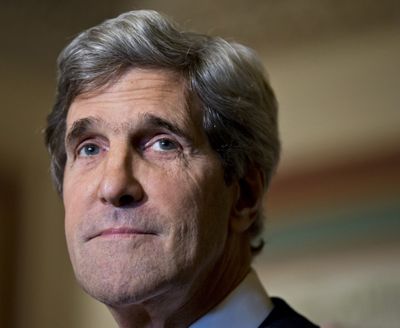Kerry tapped to lead State
Obama nominates longtime senator

WASHINGTON – President Barack Obama on Friday nominated Massachusetts Sen. John Kerry, one of Washington’s most respected voices on foreign policy, as his next secretary of state.
The move is the first in an expected overhaul of Obama’s national security team heading into his second term.
As the nation’s top diplomat, Kerry will not only be tasked with executing the president’s foreign policy objectives, but will also have a hand in shaping them. The longtime lawmaker has been in lockstep with Obama on issues like nuclear non-proliferation, but ahead of the White House in advocating aggressive policies in Libya, Egypt and elsewhere that the president later embraced.
“He is not going to need a lot of on-the-job training,” Obama said, standing alongside Kerry in a Roosevelt Room ceremony. “Few individuals know as many presidents and prime ministers or grasp our foreign policies as firmly as John Kerry.”
He is expected to win confirmation easily in the Senate, where he has served since 1985, the last six years as chairman of the Foreign Relations Committee.
Kerry would take the helm at the State Department from Secretary Hillary Rodham Clinton, who has long planned to leave the administration early next year. Clinton is recovering from a concussion sustained in a fall and did not attend the White House event.
Kerry would join a national security team in flux, with Obama expected to choose a new defense secretary and director of the Central Intelligence Agency in the coming weeks.
The 69-year-old Kerry already has deep relationships with many world leaders, formed both during his Senate travels and as an unofficial envoy for Obama. The president has called upon Kerry in particular to defuse diplomatic disputes in Afghanistan and Pakistan, two countries that will be at the forefront of Obama’s foreign policy agenda early in his second term.
At times, Kerry has been more forward-leaning than Obama on foreign policy issues. He was an early advocate of an international “no-fly zone” over Libya in 2011 and among the first U.S. lawmakers to call for Egyptian strongman Hosni Mubarak to leave power as pro-democracy protests grew. Obama later backed both positions.
Kerry would take over at a State Department grappling with the deaths of the U.S. ambassador to Libya and three other Americans during a September attack on the consulate in Benghazi, Libya.
The son of a diplomat, Kerry was first elected to the Senate in 1984. He is a decorated Vietnam veteran who was critical of the war effort when he returned to the U.S. He ran for president in 2004, losing a close race to incumbent Republican President George W. Bush.
His only other rival for the job, U.N. Ambassador Susan Rice, faced harsh criticism from congressional Republicans for her initial accounting of the consulate attack. Obama vigorously defended Rice, a close friend and longtime adviser, but GOP senators dug in, threatening to hold up her nomination if the president tapped her for the post.
Rice withdrew her name from consideration last week, making Kerry all but certain to become the nominee.